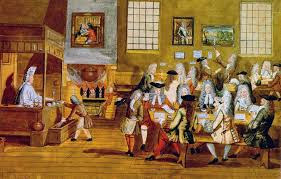Coffee Culture and History: Origins of Coffee
Title: The Fascinating Journey of Coffee: From Bean to Brew
Coffee is more than just a drink; it's a global phenomenon with a rich history that dates back centuries. From its mystical discovery in Ethiopia to its status as a beloved beverage worldwide, coffee's journey is filled with fascinating tales and cultural significance.
- The Legend of Kaldi:
- The Discovery:
- The legend begins with Kaldi, an Ethiopian goat herder who noticed his goats becoming energetic after eating red berries from a certain tree.
- Curious, Kaldi tried the berries himself and felt a similar burst of energy.
- Monastic Use:
- Kaldi shared his discovery with a local monastery where monks used the berries to stay awake during long hours of prayer.
- The news of these "magic" beans began to spread across the region.
- The Discovery:
- Coffee Houses in the Middle East:
- Birth of Qahveh Khaneh:
- In the 15th century, coffee began to be cultivated and traded in the Arabian Peninsula.
- Coffee houses known as qahveh khaneh started to appear in cities like Mecca, becoming popular social hubs.
- Cultural Hubs:
- These coffee houses were places where people gathered to drink coffee, listen to music, engage in conversation, play chess, and hear stories.
- They became known as “Schools of the Wise” for the intellectual exchange they fostered.
- Birth of Qahveh Khaneh:
- Coffee's Journey to Europe:
- Venetian Traders:
- Venetian traders were among the first Europeans to bring coffee back to the continent in the 16th century.
- Initially met with suspicion, coffee soon gained popularity in Europe.
- European Coffee Houses:
- The first coffee house in England, “The Angel,” opened in Oxford in 1650.
- Coffee houses spread rapidly across Europe, influencing culture, politics, and business. They were often called "penny universities" due to the intellectual discussions patrons could join for the price of a coffee.
- Venetian Traders:
- The Global Spread of Coffee:
- Plantations and Trade:
- European colonists established coffee plantations in tropical climates around the world, including the Caribbean, Central and South America, and Southeast Asia.
- The coffee trade became a significant part of the global economy, driving colonial expansion and the slave trade.
- Impact on Economies:
- Coffee cultivation transformed economies and societies, particularly in countries like Brazil and Colombia, which became leading coffee producers.
- Plantations and Trade:
- Modern Coffee Culture:
- Specialty Coffee Movement:
- The late 20th century saw the rise of the specialty coffee movement, emphasizing high-quality beans, artisanal roasting, and skilled brewing techniques.
- Third wave coffee culture focuses on sustainability, traceability, and a deeper appreciation of coffee as an art form.
- Global Impact:
- Today, coffee is enjoyed in countless ways across the globe, from traditional Turkish coffee to modern espresso-based drinks.
- Coffee culture continues to evolve with new trends, such as cold brew, nitro coffee, and innovative brewing methods.
- Specialty Coffee Movement:







Comments
Post a Comment